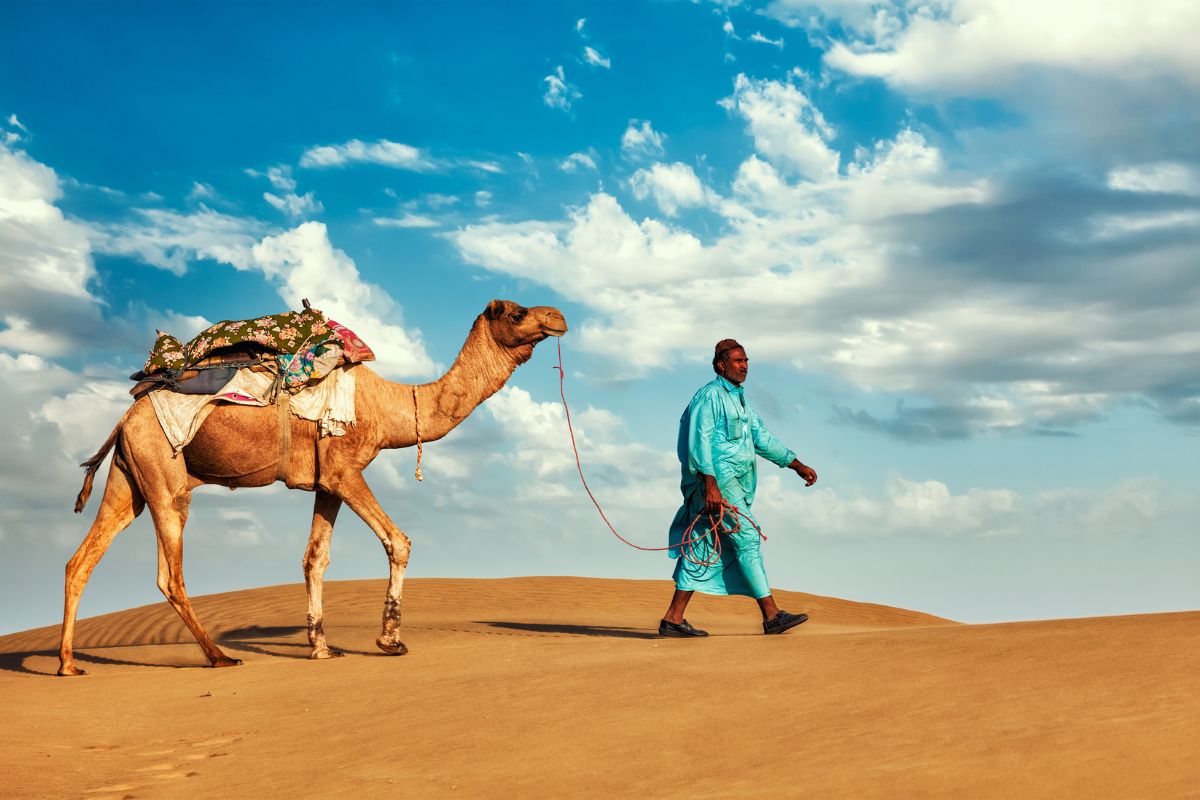
Do you know any interesting facts about camels in the UAE?
If you don’t, fear not; we have you covered.
The UAE is steeped in culture and heritage, defined by the many different festivals that take place throughout the year celebrating its many cherished traditions.
One of these major gatherings is the Abu Dhabi International Hunting and Equestrian Exhibition (ADIHEX), which pays homage to the falcon, a treasured UAE emblem.
However, another animal which holds a significant place in the culture, history, and daily life of the UAE is the camel, often referred to as the “ships of the desert”.
These remarkable creatures are not just a symbol of the country’s rich heritage but also a testament to the resilience and adaptability of life in harsh desert environments.
Here, we explore 10 interesting facts about camels in the UAE that highlight their importance and unique characteristics.
10 INTERESTING FACTS ABOUT CAMELS IN THE UAE
Camel breeding and racing

In the UAE, camel racing is a popular and traditional sport, often likened to horse racing in other parts of the world.
The country hosts numerous camel races annually, with some events attracting thousands of spectators.
Camel breeding, particularly for racing, is a meticulous process involving careful selection and training, resulting in elite racing camels that can be worth millions of dirhams.
Camel beauty contests

Beyond racing, camels in the UAE are also celebrated for their beauty. Camel beauty contests, such as the Al Dhafra Festival, draw large crowds and offer substantial prizes.
These contests judge camels on various physical attributes, including the size of their humps, the shape of their necks, and the overall symmetry of their bodies.
Milk production

Camel milk is a vital part of the Emirati diet and is renowned for its nutritional benefits. Rich in vitamins, minerals, and antibodies, camel milk is considered healthier than cow’s milk and is often used to produce a variety of dairy products, including cheese, yoghurt, and ice cream.
Desert adaptation

Camels are incredibly well-adapted to the harsh desert environment. They can withstand extreme temperatures, going for long periods without water, and consuming salty water sources that most other animals would find unpalatable.
Their thick fur protects them from the sun, and their long eyelashes and closable nostrils shield them from sandstorms.
Cultural significance

In Emirati culture, camels are a symbol of patience, endurance, and resilience and they have been integral to the Bedouin way of life for centuries.
Providing transportation, milk, meat, and even acting as dowries in traditional marriages, the camel is deeply woven into the fabric of Emirati history and tradition.
You might also like: All the best summer staycays in the UAE for the perfect escape
Genetic research

The UAE has invested significantly in camel research, focusing on genetic studies to enhance breeding practices and improve health outcomes.
This research aims to ensure the sustainability and well-being of camel populations, which are crucial to the country’s cultural heritage and economy.
Camel markets

The UAE hosts several camel markets, where camels are bought and sold for various purposes, including racing, breeding, and farming.
These markets are vibrant places that offer a glimpse into the traditional trading practices and the importance of camels in daily life.
Camel cuisine

Camel meat is a delicacy in the UAE, featured in many traditional dishes. It is often cooked in stews, grilled, or used in special preparations for festive occasions.
Camel meat is praised for its flavour and is considered a lean and healthy protein source.
Modern technology

Technology has made its way into the world of camels in the UAE. Modern racing camels are equipped with GPS trackers and trained with robotic jockeys, enhancing their performance and safety during races.
This blend of tradition and innovation showcases the UAE’s approach to preserving and modernizing its cultural practices.
Tourism and education

Camels play a significant role in the UAE’s tourism industry. Camel safaris, desert tours, and cultural experiences involving camels are popular among tourists seeking an authentic taste of Emirati heritage.
Additionally, educational programs about camels are offered to raise awareness about their importance and conservation.
Camels are much more than just animals in the UAE; they are an integral part of the nation’s identity and heritage.
From their historical roles in Bedouin life to their current status in sports, beauty contests, and tourism, camels continue to hold a place of honor and respect in Emirati culture.
These ten fascinating facts highlight the unique and multifaceted relationship between camels and the UAE, reflecting the deep bond between the people and these remarkable creatures.
Follow Yalla for all the latest Dubai arts and culture news

